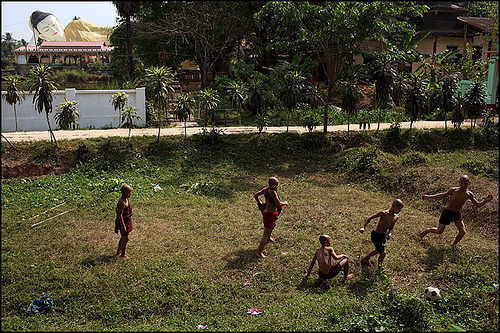I am participating in the Health Activist Writers Month Challenge, in which I publish a post every day for the month of April, based on health-related prompts.
April 5 – Ekphrasis Post: Go to flickr.com/explore and write a post inspired by the image. Can you link it to your health focus?
When my son was first diagnosed with autism, we enrolled him in a local daycare centre on the advice of his speech therapist. He needed the social aspect of it, she said. He needed the group lunchtimes, the circle times, and all of the other elements of being part of a group of children. We were nervous about letting our sensitive, vulnerable son out of our immediate orbit, particularly since the daycare had never had a child with autism before.
To their eternal credit and our eternal gratitude, the daycare welcomed George with open arms. The director of the centre arranged for all of her staff to be trained in how to work with special needs kids, and George was very happy there.
During the summer months, the kids would be taken to play outside at the end of the day while they were waiting for their parents to pick them up. I would get off the bus from work, pick up my boy, and walk home with him. One day, I picked up his backpack from the darkened daycare classroom as usual, and went out to the playground. I always tried to arrive undetected so I could watch George at play for a few minutes. In typical autistic fashion, he always did his own thing. He played among the other kids, but not with them.
On this particular day, I got to the playground just in time to see a few of the other kids preparing to have a race from one tree to another. George stood apart from the kids, watching them shyly. When the daycare teacher said, “GO!” the kids scampered away from the start line while George stood by on his own.
My heart constricted with unbearable sadness. The whole thing seemed to underscore the isolation of autism, and I felt a sense of unjustness that my child was standing there on his own. With his lanky frame and long legs, he is a natural runner. He might have won that impromptu little race.
Damn autism, I thought. I knew these other kids well enough to know that prior to lining up for the race, they would have tried to encourage George to participate. But being locked in his own world, he would not have known how to. Outwardly, he seemed perfectly happy, but I couldn’t help wondering about that. What was going through his mind as he watched those other kids at play together? Did he feel any sense of isolation? Did he wish he knew how to join in?
I started thinking about sports teams and group activities. Was George ever going to be able to be part of a soccer team or a high school band? Would he travel in a pack of teenage friends or would he sit by himself in the high school cafeteria? Would he be excluded from birthday parties? Or would some group of well-meaning kids include him in their group and look out for him?
How was my child, with his autism and his social communication deficits, going to survive in a social world?
This is a concern that is with me more or less all the time, despite assurances from his teacher that he is starting to tentatively reach out socially at school, that he is getting better and better at participating in social activities, and that he is, in fact, an extremely well-liked member of the student body.
A few days ago I saw something that made my heart soar. Me and my husband were out for a walk with the kids, and we saw the teenage boys down the road shooting hoops in their driveway. Before we could stop him, George ran up to the boys and held out his hands for the ball. The boys good-naturedly obliged, and like a true natural basketball player, George bounced the ball on his knee and then threw it towards the hoop as if he did this every day.
The hoop was too high for George to have any success, and the boys offered to lower it for him. We told them not to worry and we went on our way, but not before the boys had invited George to play basketball with them any time he wanted.
When things like this happen, my vision of the future shifts, as if I’m looking at my son’s life through a kaleidoscope. I start to see possibilities that were previously hidden to me, possibilities that simply may not have been there before George grew and developed into them. Instead of seeing the kid who stood on his own while everyone else had a race, I now see the boy who, just for a few moments, joined other boys in a basketball game.
If I had, just a year ago, seen the picture that inspired this post, I would have thought, “George is probably never going to do that. He’s probably never going to romp around with friends or be invited to take part in impromptu soccer games.”
Now I look at that picture and realize that I am seeing the emergence of George as a social being. Maybe he’ll always be shy, and it is very likely that he will always need to be surrounded by people who will look out for him.
But his personality, his character, the very essence of who he is – that is emerging bright and beautiful, like a butterfly coming out of a cocoon.










